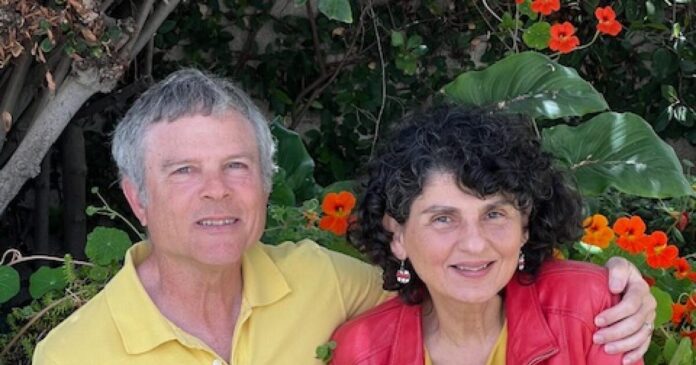They were called “living room dialogues” and were considered innovative at the time. As described by the Christian Science Monitor on February 6, 2002, (Seeking Understanding…one dinner at a time), “it looks like an ordinary party-guests are arriving and greeting one another with hugs; many of them carrying dishes of food. There is general joking, teasing, and catching up on what has happened the past few weeks.
“This get-together is a once-a-month affair, an opportunity for Jews and Palestinians in the San Diego area to meet over tabouli, falafel and latkes, and talk frankly- sometimes uncomfortably — about the historic divide that has kept their people at war for two generations.”
Doris Bittar, who is of Lebanese and Palestinian descent, and her Jewish husband, Jim Rauch, were mentioned in the 2002 article. They started four such San Diego groups beginning in 2001 as part of Arab-Jewish Dialogue, a national grass-roots movement.
Doris and Jim’s “living room dialogues” continued for seven years.
“There were plenty of emotional debates and some felt they were not being heard,” Doris said. “But people also became friends.”
“It was the personal stories, rather than pontificating, that were important and helped us bond,” Jim added. “They helped humanize us and dissolve fear.
“Everyone was allowed to speak their truth — no silencing.”
Dialogue comes easy to Doris and Jim. They attribute their long-term marriage of 40 years, despite cultural differences, as partially due to dialogue. “We talk about the Middle East all the time,” Jim said.
Over the years, the couple faced the pain and frustrations of Israeli/Palestinian conflicts. Sometimes they agreed and sometimes not. “The disagreements,” Doris said, “are just frustrations.”
Born in 1959 in Baghdad, Doris immigrated to the U.S. in 1965 with her four siblings, Palestinian father and Lebanese mother. The family was economically poor.
Doris, who earned a college degree and master’s in fine arts, enjoyed a career as an artist focusing on heritage and culture, particularly the Arab culture. She taught at the university level for 25 years, published more than 60 essays and founded three nonprofits. She has shown her work nationally and internationally, earning recognition and awards as a well-respected artist.
Growing up, Doris faced stereotyping based upon her Arab background. As a professional, she experienced discrimination. “Shortly after 9/11,” she recounts as an example, “I was [invited to show] an exhibit [at a San Diego museum] and then uninvited, stating that it was because I was Arab. I was shocked. Even though it has been 20 years, I continue to feel the pain of it.”
Born in 1959 in New Jersey, Jim was high school valedictorian, earned a degree from Princeton and a doctorate in economics from Yale. He taught economics at UC San Diego for 36 years, rising to full professor and department chair. Among many other writings, he authored three books, including one on Middle East economics.
As a child, Jim’s mother would tell him about their European relatives killed in concentration camps during the Holocaust. He recalls seeing numbers on a family friend’s arm and being told the man had been in a concentration camp. “That made an impression on me that I have never forgotten,” he said.
Jim recalls experiencing during grade school antisemitism in the form of slurs. “Many came from friends,” he said. “It felt demeaning.”
Both families moved to White Plains, N.Y., where Doris and Jim met in 1975 and began dating in high school. They were married in 1984.
Today, they are semi-retired living in North Park and have two grown sons.
They continue to believe that dialogue — not violence — is the path to peace in the Middle East. “The legacy of [living room] dialogues continues today, especially when we see courageous Jewish and Palestinian Americans lead the current peace movement and protests,” Doris said.
“Those who want solutions must be at the table and choose their own representation here and there,” Jim added. “All at the table must be equals and learn not to silence one another if there ever is to be peace.”
About this series
Goldsmith is a Union-Tribune contributing columnist.
We welcome reader suggestions of people who have done something extraordinary or otherwise educational, inspiring or interesting and who have not received much previous media. Please send suggestions to Jan Goldsmith at [email protected]



